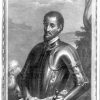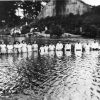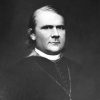calsfoundation@cals.org
Nicolas Foucault (1664?–1702)
Nicolas Foucault was the first Christian missionary to serve among the Quapaw Indians of Arkansas.
Nicolas Foucault was born around 1664 in Paris, France. As a young adult, he joined the Seminary of Foreign Missions in Paris but soon left to pursue his ministry in Quebec via La Rochelle, France, on board the Soleil d’Afrique. On June 3, 1688, Foucault arrived in Québec and immediately began to serve as a secretary to Bishop Jean-Baptiste de Saint-Vallier while also continuing his seminary studies. He was ordained to the priesthood on December 3, 1689, and was immediately appointed to serve as curate first, in Contrecoeur, then in the hamlet of Batiscan on the banks of the St. Lawrence River.
Here, Foucault presided over dozens of weddings, baptisms, and funerals of French colonizers and soldiers who had settled in this part of the river valley. Controversy struck in 1694. François de Jordy, a local officer, was having an affair with Marguerite Dizy, wife of a fur trapper. Both were consequently banned from attending church in Batiscan, though this did not stop de Jordy from attending a funeral. According to La Mothe, Sieur de Cadillac, during the funeral, Father Foucault was celebrating at the altar when he looked up and saw de Jordy sitting in the back. He stopped the service, retired to the sacristy to remove his robes, and then returned to the nave to confront the officer. Cadillac, very supportive of his soldiers and less so of any clergy, described Foucault’s actions as most odd. Foucault’s face turned whiter than the body in the casket; dismissed everyone from the church, locked the door, and finished the service with only his assistant present. Calm eventually returned to Batiscan, and Foucault remained as curate until his departure for the Arkansas River, sometime after June 16, 1700, his last entry in the Batiscan Registry.
In 1698, some nine years after a request from Henri de Tonti, Bishop Saint Vallier granted permission to the Seminary and Foreign Missions of Quebec to set up missions along the Mississippi River. Foucault would be assigned to the Quapaw in 1700. Though Bishop Laval remarked that Foucault had all of the good qualities needed to succeed in the region, Henri Tremblay, Director of the Foreign Missions, felt that his health was too poor and feared that he would fail. However, plans continued, and supplies—including small bells, a ream of paper, signet rings, candles, two confessional boxes, a cassock, and hats for Foucault—were shipped to the mission.
The exact date Foucault arrived among the Quapaw is unclear, though two letters suggest that it was sometime between May and August 1701. On April 27, 1701, from the Chickaga, Foucault remarked that he and a fellow priest, one Brother Gilles, were slowly recovering from their illness. On April 28, 1701, he arrived among the Tamaroa, where Father Marc Bergier, the Superior of the Seminary Missionaries in the Mississippi Valley, resided. Either at the request of Bergier or Sieur d’Iberville, Foucault left the Tamaroa village to establish his mission among the Quapaw. In August 1701, Father Jean François Buisson de St. Côsme remarked that the small Arkansas mission could survive with less funding and rely on the abundant resources within the vicinity. St. Cosme suggested inviting his younger brother, Michel, to assist Foucault in Arkansas since he spoke the Illinois language and several Illinois women were married to Quapaw men.
To date, knowledge of Foucault’s work stems primarily from comments made by Father Marc Bergier, who was the leader of the Foreign Missions missionaries and Foucault’s primary confidant. Bergier remarked that the Quapaw “mistreated” Foucault and that he was discouraged by his inability to work with them. On March 13, 1702, Bergier suggested removing Foucault, since he was not well established and it was not a considerable mission to begin with. However, on July 10, 1702, Jesuit priest Gravier remarked that Foucault was working with great zeal among the Quapaw with a valet as an assistant.
Sometime in late July 1702, François Danbourné, St. Laurent, and another companion entered the Quapaw village. They had been sent out by Iberville to settle a dispute between the Illinois and the Chickasaw. Foucault decided to take his leave with them. However, the soldiers were ill, and thus Koroa Indians, visiting the village at that time, were recruited to take Foucault and the others down the Mississippi River. For whatever reason—perhaps for riches or to exact revenge for mistreatment—Father Foucault and his companions were killed not long after their departure. The Koroa murderers stopped by a Yazoo village, announced the crime, and gave the Yazoo some of the booty secured from Foucault’s possessions.
Father Antoine Davion, missionary among the Tunica, had been on his way to visit Foucault at the time of the murders. One day’s journey from arriving among the Quapaw (whom the French called the “Arkansas”), he came upon the scene of Foucault’s death. Davion’s letters state that he knew it was Father Foucault only because he recognized the hats, plates, and Foucault’s altar, which was still set up, along with papers written in Foucault’s handwriting. Thoroughly horrified, Davion left his mission among the Tunica and went to Mobile (in present-day Alabama) to recover.
Despite earlier criticism, many colleagues applauded the work of Foucault. Tremblay saw his death as a tragic loss, while Bergier referred to him as irreplaceable, claiming that he had actually done some good among the Quapaw. In 1704, the Quapaw avenged Foucault’s death, virtually destroying the Koroa and thus displaying their sense of kinship to this first missionary among them.
For additional information:
Arnold, Morris. Colonial Arkansas, 1686–1804: A Social and Cultural History. Fayetteville: University of Arkansas Press, 1991.
———. Rumble of a Distant Drum: The Quapaw and Old World Newcomers, 1673–1804. Fayetteville: University of Arkansas Press, 2000.
Jones, Linda C. “1698–1707, Conversion of the Tamaroas and the Quapaws: An Unlikely Outcome in the Missions of the Seminary of Québec.” MA thesis, University of Arkansas, 1997.
———. “Nicolas Foucault and the Quapaws.” Arkansas Historical Quarterly 75 (Spring 2016): 2–26.
Linda Carol Jones
University of Arkansas, Fayetteville







Comments
No comments on this entry yet.